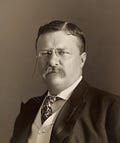The bureaucrat’s contempt for the artistic vocation, the scorn for the followers of Calliope, received full articulation at New York’s Ellis Island on June 8, 1910. William Peterson, Danish Poet, was detained by immigration officials as he attempted to re-enter the United States.
Peterson hadn’t expected a problem. After living in New York for twelve years, he had traveled back to Denmark for a short visit and a bit of a victory lap. Now he was returning to his adopted city and his mission: writing and reciting epic poetry to entertain New York’s Scandinavian community. He might not have captured the attention of the city’s literati, but he was doing all right.
Peterson was so proud of his success, that, on the return trip to New York, he entertained his fellow passengers with an oration entitled “America, and How to Succeed There.”
America’s immigration officers judged success differently. The Poet reached Ellis Island with a mere $24 to his name. When asked how he intended to support himself in the United States, Peterson replied that he was a literary man.
Writing—be it prose or poetry—declared the immigration officer, was not a reliable means of earning a living. Peterson’s application for entry was denied and he was scheduled for deportation.
No champion stepped forward to challenge the brusque rejection. Even the newspapers, which should have supported a fellow writer, endorsed the sentence. “We do not want to rejoice in the descent of Peterson’s Muse,” wrote a hack for the Richmond Times-Dispatch, “and we mourn with the Scandinavians of New York who have lost their well-beloved songster, but we could only wish that with the deported Peterson were exiled some thousands of our present-day poets. Their immigration into England and the Continental countries would be a sad blow to them, but it would be a blessing to America.”
Not Much Better in France
Do what you will with your national poets, the French litterateurs, might have responded, but don’t send them here. France was a basalt monolith, upon which the dreams of ten thousand authors had been smashed. The country’s writers reported tough markets and little pay. Many failed to attain even Poet Peterson’s modest finances; they found it impossible to earn a living with their quills.
This negative assessment seemed odd; at first glance, French literature was blooming. Serialized fiction enjoyed great popularity in the newspapers and magazines; many readers preferred the imaginative accounts to regular news articles. Demand remained strong.
Unfortunately, newspaper and magazine publishers had begun to outsource the work. They discovered that they could purchase literary rights from foreign authors—English, Russian, Italian, or German—and even after translation costs, pay no more than a twentieth of what a French author demanded. It was a simple exercise in profit and loss, with the publishers claiming the former, and France’s authors experiencing the latter.
The glory days of French literature, when a popular writer like Jules Mary could charge 30,000 francs (roughly $133,000 today) for the first serial publication of a thriller, had lapsed. Like a Scandinavian poet, the literary lions of French had ceased to roar.
But Celebrity Still Paid
The majority of writers couldn’t earn enough to satisfy a suspicious immigration agent, but that didn’t mean the entire community suffered. Celebrity writers still minted money. Former president Theodore Roosevelt, for example, was reaping a record harvest. As William Peterson returned to his home country, Scribner’s magazine printed monthly installments of Roosevelt’s African Trails.
On March 23, 1909, having completed his second term as president, Theodore Roosevelt departed for a nine month hunting expedition in East Africa. Would he survive the adventure? There were doubters. If he managed to avoid the tropical diseases endemic to the area, he still faced a range of dangerous animals. “In the African lion, which, when aroused, will fight till shot to pieces,” wrote the Atlanta Journal, “he will encounter a foe besides which hostile newspapers and warring senators will be as nothing.”
It promised to be a thrilling adventure. Scribner’s magazine offered Roosevelt one of the most lucrative writing contracts in American literary history. He would write monthly installments which would be printed in the magazine and later compiled into a book. In exchange, Scribner’s agreed to pay $1 for each word that Roosevelt submitted—$32.88 when adjusted to a modern frame of reference. Two short sentences would earn more than Poet Peterson’s life savings.
Scribner’s believed that reader interest would compensate for the stratospheric royalties. The company was right: magazine sales leaped seventy-five percent when the first installment hit the newsstands. International syndication dropped more black ink beneath the bottom line. Publishers in England, Germany, Italy, and Austria quickly licensed the product for translation and serialization in their countries.
Unsurprisingly, French publisher Hachette stacked more grief, like burning coals, upon the foreheads of France’s native writers. The company hurled a pile of francs at Roosevelt’s epic, purchasing the rights for monthly syndication and a book deal.
For writers who weren’t Theodore Roosevelt, the message was clear. Celebrity—then and now—represented the easiest route to a sustainable literary career.
Enjoy this week’s installment? Why not forward it to a friend and facilitate the spread of quirky history?
And if you haven’t subscribed yourself, click here to make sure you never miss a weekly issue:



